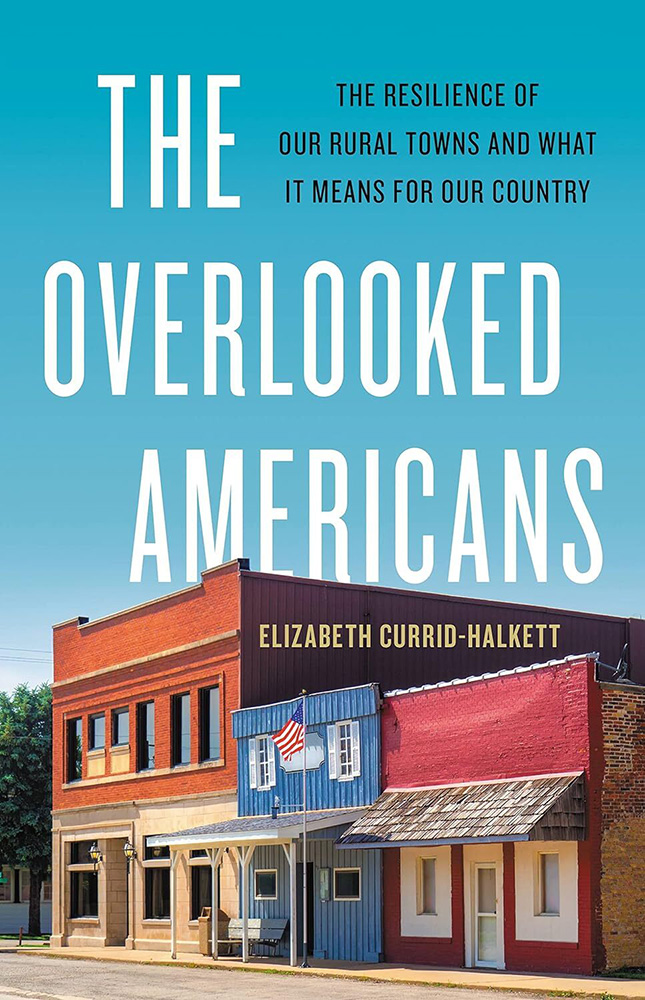Elizabeth Currid-Halkett Exposes the Myth of the Rural-Urban Divide

USC Price professor says rural and urban dwellers are more alike than not, providing a ray of hope for how to get along
I meet Elizabeth Currid-Halkett in a sleek new café in Silverlake, the latest epicenter of L.A.’s moneyed hipsters. The eatery, with its satiny wooden-topped tables and breezy patio, is squeezed between an industrial glass shop and a store called Rough Trade on Sunset Blvd.
Currid-Halkett is slim and tall at 5-foot-8, with reddish-brown bangs that come to rest above large blue eyes. She wears faded jeans and an ankle-length crocheted sweater whose multiple colors pop in the restaurant’s generous light.
She orders a salad with radicchio and chicken (she makes sure it’s free range), and I have the “whipped ricotta toast” topped with something called “macerated stone fruit and bread brittle.”
We might as well be the poster children for “Coastal Elites.” The food, the place, the neighborhood – and the latte – are exactly the kinds of cultural signifiers that supposedly annoy rural Americans put off by all things precious, especially when they emanate from a café located a matcha scone’s throw from the Hollywood sign.
But Currid-Halkett insists that those same people would not be put off by us.
“I think people get too distracted by our superficial signifiers of cultural capital and whether we do yoga or go for a hike, or whether we go to church or to a museum on the weekends,” she said. “At the end of the day we’re all human beings and we can find connection in that simple fact.”

In her latest book, The Overlooked Americans: The Resilience of Rural Towns and What It Means for Our Country, Currid-Halkett posits that rural and urban Americans have far more in common than not. When it comes to bedrock issues like democracy, environmental protection, family and hard work, there is no light between those who live in the country or the city.
Moreover, most rural Americans could care less about the partisan politics that animate so much of our news coverage – and they don’t while away their time seething about Los Angeles liberals.
“You’ve got to understand that rural Americans have their own complicated lives, and they are far more concerned with their families, upcoming holidays and their parents’ health than they are about what liberal elites think about them,” she said. “If you find this hard to believe, ask yourself what you care about and you will probably come up with the same answer.”
The book also makes the case that a lot of rural communities are faring just fine and are not, as the media often portray them, full of undereducated, opioid-addled malcontents. Incomes, levels of education, and professions are often remarkably similar in rural and urban communities, even if there are pockets of desperately poor communities in rural America — just as there are in cities.
Understanding what rural communities value
Currid-Halkett, the James Irvine Chair in Urban and Regional Planning and Professor of Urban Policy at the USC Sol Price School of Public Policy, knows small-town America well. The daughter of Irish immigrants – her mother was a doctor and her father a PhD – she grew up in Danville, PA, population 5,000. By and large, she said, people in her hometown lead fulfilling lives.
Her experience is 180 degrees from the dark, and often condescending, descriptions of rural life she hears from academics, journalists – and the politicians who stoke divisiveness into an electoral advantage.
To see if rural life across America was similar to that in Danville, Currid-Halkett planned to pack up her husband and three boys and drive across the country, stopping along the way to interview a wide cross section of rural residents. When COVID put a kibosh on that plan, she turned to the telephone, spending hundreds of hours interviewing dozens of Americans in tiny villages, mid-sized towns and even some urban settings.

The phone turned out to be an advantage: Not being able to see people eliminated the temptation to judge them based on their looks.
Her questions ranged from cocktail party chatter – “What’s your favorite food?” – to the weighty: “What do you value most?”
“I wasn’t interested in their divisions, I was interested in the humanity of those I interviewed,” Currid-Halklett writes in her book.
She combined this research with a deep dive into government and academic data to draw a nuanced – and largely hopeful – picture of rural America.
As it turns out, yes, rural and urban Americans can get along.
While the book focuses on people, not their politics, Currid-Halkett says her findings do help explain why rural Americans are more likely to vote for Donald Trump and why he and Joe Biden are now in a dead heat for the White House.
“He is not swaying voters with issues,” she said of Trump. “He’s swaying them by understanding them, or he at least conveyed the sentiment that he wanted to understand them, and that’s really been lacking in a lot of politicians.”
With her research completed, Currid-Halkett retreated to her home office – in between taking her kids to dinosaur museums and advising PhD students – to write The Overlooked Americans, which was published in July.
The book has been reviewed by the National Review, NPR, The Wall Street Journal and Slate, among others. She’s comforted by the fact that the leftist Slate thought the book was too kind to ruralites, while the right-leaning Journal dismissed her as a coastal elite – conveniently omitting the fact that she grew up in rural America. She figures she must have done something right if she annoyed reviewers from both sides of the political aisle. Most of the other reviews have been positive.
Researching modern culture, winning a Guggenheim
Currid-Halkett was preparing to complete her PhD in urban planning at Columbia University in 2006 when she started to ponder how she was going to make a living. She already had her first book deal, but the proceeds weren’t enough to pay the bills, so she figured she’d keep waiting tables to make ends meet.
Then she got a call from the USC Price School. So much for waitressing.
The insights she has conveyed through her four books have not gone unnoticed. In 2022, she was appointed the Kluge Chair in Modern Culture at the Library of Congress. Earlier this year, she received a Guggenheim Fellowship, one of the most prestigious awards in American academia. She is using the fellowship to fund her next line of research.
Although her books have distinct themes, culture, in all of its complicated, nuanced and opaque manifestations, is the throughline. Like a great work of art or a well-seasoned bowl of pasta, it’s often hard to adequately describe, but, she says, “culture is crucial to understanding the world.”
And as The Overlook Americans found, understanding culture is essential to understanding what unites us – and how to overcome what divides us.
Related faculty

Elizabeth Currid-Halkett
Professor
James Irvine Chair in Urban and Regional Planning